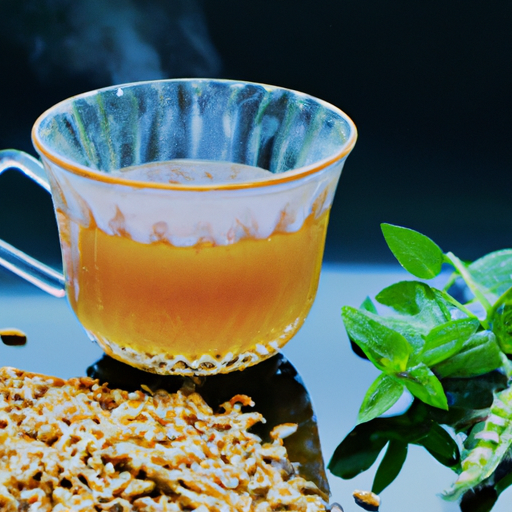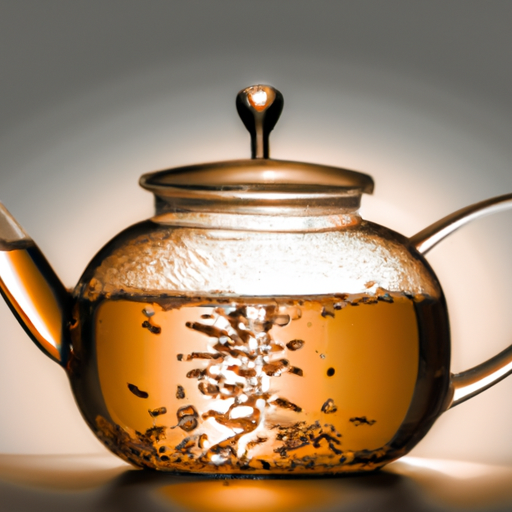As an individual who prioritizes living healthily, I constantly search for fresh and intriguing methods to enhance my overall health. Not too long ago, I stumbled upon a drink that’s becoming quite the trend among those focused on wellbeing: barley tea. This non-sweetened beverage is crafted using roasted barley grains and is widely popular in Japan, Korea, and various Asian regions.
While some may view barley tea as just another trendy health fad, there are actually many potential benefits to drinking it regularly. From improving heart health to aiding in weight loss efforts, this beverage has a lot to offer.
In this article, we will explore the nutritional value of barley tea and take a closer look at the scientific evidence behind its various health claims. So grab a cup of your favorite hot beverage and join me as we dive into the world of barley tea!
Key Takeaways
- Barley tea is a popular East Asian beverage that is low in calories, caffeine-free, and contains no added sugars.
- It is an excellent source of vitamins, minerals, and antioxidants, and has been traditionally used to aid in digestion and regulate bowel movements.
- Barley tea may improve heart health, reduce inflammation, aid in weight loss, and help regulate blood sugar levels.
- While it should be consumed in moderation, barley tea is a practical and natural way to improve overall health and wellness.
Overview of Barley Tea
Barley tea, a popular beverage in East Asia, is not only refreshing but also has potential health benefits. It is made from roasted barley grains that are steeped in hot water, and is also known as mugicha in Japan and boricha in Korea. Its origin can be traced back to ancient China where it was believed to have medicinal properties.
Today, barley tea is widely consumed for its taste and cultural significance. In many East Asian countries, it is a common drink served at meals or offered to guests as a sign of hospitality. It is often enjoyed during the hot summer months as a cooling beverage.
In addition to its cultural importance, barley tea has been studied for its potential health benefits. Some studies suggest that it may help with digestion and improve cardiovascular health. Despite its popularity and potential health benefits, barley tea is relatively low in calories and contains no caffeine or added sugars. This makes it a great alternative to other sugary drinks like soda or energy drinks.
So next time you’re looking for a refreshing drink with potential health benefits, consider trying out some barley tea!
Nutritional Value of Barley Tea
You’ll love the taste and feel great knowing that this tea contains essential nutrients! Barley tea is a delicious and refreshing beverage that offers numerous health benefits. It’s an excellent source of vitamins and minerals, including potassium, magnesium, calcium, and iron. These nutrients are essential for maintaining healthy bones, muscles, and overall body function.
In addition to its impressive nutrient profile, barley tea is also rich in antioxidants. Antioxidants are compounds that help protect our bodies from damage caused by harmful molecules called free radicals. By consuming foods and beverages high in antioxidants, such as barley tea, we can support our body’s natural defense system against oxidative stress.
Barley tea contains potassium, which helps regulate blood pressure. The magnesium found in barley tea supports healthy muscle function, and calcium is important for strong bones and teeth.
Barley tea’s nutrients and antioxidants make it a great choice for those looking to improve their overall health. Its unique flavor profile makes it a perfect alternative to sugary drinks or caffeine-heavy beverages like coffee or black tea. In the next section, we’ll explore some potential health benefits of drinking barley tea regularly.
Potential Health Benefits
Consuming this refreshing beverage on a regular basis may have the potential to improve various aspects of overall well-being. Barley tea has been used as a traditional remedy for digestive issues in East Asia for centuries, and recent studies suggest that it may indeed have beneficial effects on digestion. The high fiber content of barley tea can help to regulate bowel movements and prevent constipation.
Moreover, barley tea is known to contain antioxidants, which can help to protect against oxidative stress and boost the immune system. Antioxidants are important because they neutralize harmful free radicals that can damage cells and contribute to chronic diseases like cancer and heart disease. Additionally, research has shown that some compounds found in barley tea may have anti-inflammatory properties, which could further benefit the immune system.
To summarize, there are several potential health benefits associated with consuming barley tea. From aiding digestion to boosting the immune system through its antioxidant content, this beverage is an excellent addition to any healthy lifestyle. In the next section, we will explore the scientific evidence behind these claims and delve deeper into how exactly barley tea impacts our bodies.
Scientific Evidence Behind the Claims
I found it interesting to look into the scientific evidence behind the potential health benefits of barley tea.
Through my research, I discovered a number of studies that have been conducted on this topic.
The results and conclusions from these studies provide insightful information on how consuming barley tea may positively impact our health.
Research studies conducted
Several research studies have explored the potential health benefits of drinking barley tea. One study published in the Journal of Food Science found that barley tea contains high levels of antioxidants, which can help protect against chronic diseases such as cancer and heart disease.
Another study conducted by researchers at Kyushu University in Japan found that drinking barley tea can improve blood flow and lower cholesterol levels.
Despite these promising findings, there are potential limitations to current research on the health benefits of barley tea. For example, many studies have only been conducted on animals or small groups of humans, making it difficult to generalize results to larger populations.
Additionally, more research is needed to compare the potential health benefits of barley tea with other herbal teas. Future research may also explore how different brewing methods or varieties of barley affect the health properties of this popular beverage.
As we move into discussing results and conclusions, it’s important to consider both the potential benefits and limitations of consuming barley tea for our overall health and well-being.
Results and conclusions
The research studies conducted on the health benefits of barley tea have yielded promising results. Some of the studies indicate that regular consumption of barley tea can help in reducing blood pressure, managing cholesterol levels, and preventing certain types of cancers. However, it’s important to note that these findings are not conclusive and more research is needed to validate these claims.
Possible limitations of the current research include small sample sizes and variations in preparation methods. There are also areas for future research, such as investigating the effects of long-term consumption and exploring how different varieties or brewing techniques impact its health benefits. Despite these limitations, incorporating barley tea into one’s diet is a practical application for those seeking to improve their overall health and wellness.
Incorporating barley tea into your daily routine may be a simple yet effective way to reap its potential health benefits. Consider swapping out your morning cup of coffee for a warm mug of barley tea or enjoy it as an afternoon pick-me-up instead of sugary snacks or drinks. As we continue to learn more about this ancient beverage, it’s clear that there is much more to explore when it comes to the potential health benefits it has to offer.
Transitioning from this topic, let’s now take a closer look at how drinking barley tea may benefit those with diabetes.
Barley Tea for Diabetes
Barley tea has been shown to potentially help regulate blood sugar levels in individuals with diabetes, with one study finding that consuming barley tea reduced postprandial glucose levels by 13.4%. In addition, barley tea may also improve insulin sensitivity, which is crucial for managing diabetes. This means that the body becomes more efficient at using insulin to control blood sugar levels.
To better understand how barley tea can affect blood sugar and insulin sensitivity, let’s take a closer look at some of the nutrients found in this beverage. Barley contains beta-glucans, a type of soluble fiber that can slow down the absorption of carbohydrates and reduce spikes in blood sugar after meals. Moreover, barley is rich in antioxidants such as phenolic acids and flavonoids, which have been shown to protect against oxidative stress and inflammation – two factors that can impair insulin function.
Overall, incorporating barley tea into your diet may be beneficial for managing diabetes and improving overall health. However, it’s important to note that this beverage should not replace prescribed medication or dietary recommendations from a healthcare professional. In the next section, we’ll explore how barley tea can also support heart health.
| Nutrient | Amount per 100g | Function |
|---|---|---|
| Beta-glucans | 3-8g | Soluble fiber that slows carbohydrate absorption |
| Phenolic acids | Up to 700mg | Antioxidants that protect against oxidative stress |
| Flavonoids | Up to 400mg | Antioxidants that reduce inflammation |
Barley Tea for Heart Health
I want to talk about how barley tea can benefit heart health. Studies have shown that drinking barley tea regularly can help reduce the risk of heart disease. This is because it lowers cholesterol levels and prevents plaque buildup in arteries. To reap these benefits, it’s recommended to drink at least 3 cups of barley tea per day as part of a healthy diet and lifestyle.
How it can help reduce the risk of heart disease
Reducing the risk of heart disease can be achieved by regularly drinking barley tea. This is because barley tea has properties that help improve cholesterol levels and reduce inflammation in the body.
Here are some ways how:
- Barley tea contains antioxidants called lignans, which have been shown to reduce LDL (bad) cholesterol levels in the blood.
- The fiber present in barley tea also helps to lower total cholesterol levels, as it binds to bile acids and removes them from the body.
- Additionally, studies have found that regular consumption of barley tea can help to reduce inflammation in the body. Chronic inflammation is linked with various health conditions, including heart disease.
With these benefits in mind, incorporating barley tea into your daily routine may be a simple step towards improving your heart health. But how much should you drink? Let’s explore the recommended intake for heart health.
Recommended intake for heart health
To achieve optimal heart health, it’s important to know the recommended amount of barley tea you should drink daily. According to studies, consuming 3-4 cups of barley tea per day is effective in reducing cholesterol levels and lowering the risk of heart disease. This is because barley contains beta-glucan, a type of soluble fiber that can help lower LDL or ‘bad’ cholesterol levels in the body.
Incorporating barley tea into a heart healthy diet can also provide additional benefits such as improved blood pressure and circulation. It’s important to note that while drinking more than 4 cups per day may not necessarily harm your health, it’s always best to consult with a healthcare professional before making any significant changes to your daily routine.
With this in mind, let’s explore how drinking barley tea can benefit those suffering from arthritis.
Barley Tea for Arthritis
Barley tea has been known to ease joint discomfort, making daily activities more comfortable. This is because of its anti-inflammatory properties that help reduce joint inflammation and provide arthritis relief. Barley tea contains antioxidants called lignans, which have been shown to help lower the risk of chronic diseases associated with inflammation, including osteoarthritis.
In a study published in the Journal of Nutrition, researchers found that drinking barley tea helped decrease inflammation markers in mice with rheumatoid arthritis. The study suggested that barley tea could be an effective natural remedy for those suffering from arthritis. Moreover, it can also aid in reducing pain and stiffness caused by this condition.
While barley tea may not cure arthritis completely, incorporating it into your daily routine can make a significant difference in managing your symptoms.
Now let’s move on to the next section about ‘barley tea for weight loss,’ where I’ll share more about how this healthy beverage can help you shed off some extra pounds without compromising your health.
Barley Tea for Weight Loss
I’ve been trying to lose weight for a while now and I recently discovered the benefits of barley tea. Barley tea is known to aid in weight loss by boosting metabolism and reducing appetite. The recommended intake for weight loss is one to two cups a day. This can be easily incorporated into your daily routine.
How it can aid in weight loss
You’ll be happy to know that drinking barley tea can help you shed some extra pounds. This is because barley tea contains compounds that are beneficial for digestion and metabolism improvements. These compounds, such as fiber and antioxidants, aid in the breakdown of food and boost your body’s ability to burn calories.
Drinking barley tea regularly can also give you a feeling of fullness, which means you’ll eat less and consume fewer calories throughout the day. However, it’s important to note that while barley tea can aid in weight loss, it shouldn’t be relied on solely for achieving weight loss goals.
In the next section, I’ll discuss the recommended intake for weight loss and how it should be incorporated into a healthy diet plan.
Recommended intake for weight loss
To maximize your weight loss efforts, it’s recommended to incorporate drinking barley tea into your daily routine in moderation. Daily consumption of the tea can promote weight loss due to its low calorie content and ability to aid digestion. Here are some benefits of incorporating barley tea into your diet:
-
Aids in digestion: The antioxidants and fiber found in barley tea can help regulate bowel movements, reducing bloating and constipation.
-
Lowers blood sugar levels: Barley tea contains compounds that can help lower blood sugar levels, making it an ideal beverage for those with diabetes or pre-diabetes.
-
Boosts metabolism: Drinking barley tea regularly can speed up your metabolism, aiding in weight loss.
-
Hydrates the body: Staying hydrated is essential when trying to lose weight. Barley tea is a hydrating beverage that can replace sugary drinks while also providing additional health benefits.
To see the best results from drinking barley tea for weight loss, it’s best to consume it before meals or throughout the day as a replacement for high-calorie beverages.
Now that you know about the benefits of drinking this nutritious beverage, let’s move on to how you can prepare it at home.
How to Prepare Barley Tea
Now that we know the health benefits of barley tea, let’s move on to discussing how to prepare it.
To recap, barley tea aids in weight loss, promotes digestive health, and may even help prevent cancer.
As someone who’s personally experienced the benefits of this beverage, I highly recommend incorporating it into your daily routine.
In my opinion, a cup of freshly brewed barley tea is the perfect way to start your day on a healthy note!
Recap of the health benefits of barley tea
Don’t miss out on the amazing health benefits of barley tea. It’s a natural way to lower cholesterol and blood sugar levels. Barley tea is packed with antioxidants that help protect our cells against damage from free radicals. This can lead to chronic diseases such as cancer, heart disease, and diabetes.
Moreover, drinking barley tea regularly may also improve digestion, boost metabolism, and aid in weight loss. As we know, hydration is crucial for maintaining good health. Drinking tea is an excellent way to stay hydrated while reaping all the benefits that come with it.
Barley tea is no exception – not only does it hydrate your body, but it also provides additional health advantages that make it a worthwhile addition to your daily routine. In conclusion, incorporating barley tea into your diet can be an easy and effective way to promote overall well-being.
Final thoughts and recommendations
As we come to the end of our discussion, it’s worth noting that incorporating this delicious beverage into your daily routine can go a long way in promoting overall wellness – after all, a stitch in time saves nine!
However, it’s important to remember the importance of moderation when consuming barley tea or any other food or drink. While there are numerous health benefits associated with barley tea, excessive intake may lead to adverse effects.
Incorporating barley tea into your daily routine can be as simple as swapping out your regular cup of coffee or soda for a refreshing glass of iced barley tea. Not only does it offer numerous health benefits such as improved digestion and reduced inflammation, but it also serves as a low calorie and caffeine-free alternative.
So next time you’re looking for a healthy beverage option, consider trying out some barley tea – your body will thank you!
Frequently Asked Questions
Can barley tea be consumed by people with gluten intolerance or celiac disease?
As someone with gluten intolerance or celiac disease, it’s important to seek out gluten-free options for barley tea. Fortunately, there are brands that offer certified gluten-free versions of this popular beverage.
In terms of health benefits for gut health, barley tea has been shown to have anti-inflammatory properties and may help improve digestion. Additionally, it contains antioxidants that can support overall health and may even reduce the risk of certain chronic diseases.
While more research is needed in this area, incorporating barley tea into a balanced diet can be a delicious way to promote gut health.
Is there any specific time of the day when drinking barley tea is more beneficial?
As someone who enjoys drinking barley tea regularly, I can confidently say that the best time to consume this beverage is in the morning or early afternoon.
Not only does it provide a refreshing and soothing experience, but its health benefits are most effective when consumed earlier in the day. Barley tea has been shown to improve digestion, reduce cholesterol levels, and even aid in weight loss.
Therefore, starting your day with a warm cup of barley tea can help kickstart your metabolism and promote overall wellness throughout the day. Incorporating barley tea into your daily routine is an easy way to reap these benefits while enjoying a delicious and comforting beverage.
Can barley tea be used as a natural remedy for skin conditions?
I’ve done some research on the benefits of barley tea for skin. I found that it can be used as a natural remedy for various skin conditions. Barley tea contains antioxidants that help fight against free radicals, which can damage the skin and cause premature aging. Additionally, drinking barley tea can help improve blood circulation, which promotes healthy skin.
To make barley tea at home, simply boil water and add roasted barley grains or tea bags to it. However, while barley tea has its benefits for the skin, it’s not a substitute for commercial skincare products. While natural remedies can be effective, they may not always be enough to address specific skin concerns. It’s best to use them in conjunction with other skincare practices and products recommended by professionals to achieve optimal results.
Does barley tea have any adverse effects on the liver or kidneys?
I’ve researched the potential adverse effects of barley tea on liver function and kidney health. While there is limited research specific to these organs, studies suggest that consuming large amounts of barley may increase the risk of liver damage in individuals with pre-existing liver conditions.
However, moderate consumption of barley tea is generally considered safe for most people and may even offer protective benefits for liver function. As for kidneys, there is no evidence to suggest that barley tea has any negative impact on kidney health. In fact, some studies suggest that the antioxidants found in barley tea may actually benefit kidney function by reducing oxidative stress.
Overall, it seems that moderate consumption of barley tea can be a healthy addition to one’s diet without negatively affecting liver or kidney health.
Can barley tea be used as a natural sleep aid?
I’ve researched the use of barley tea as a natural sleep aid and found that there is limited evidence to support its effectiveness. While some studies suggest that barley tea may have calming effects and reduce anxiety, there is no conclusive evidence showing it directly promotes better sleep.
Additionally, compared to sleeping pills, barley tea may not be as effective in treating chronic insomnia. However, incorporating barley tea into a bedtime routine may still have potential benefits for relaxation and stress reduction.
As always, it’s important to consult with a healthcare professional before trying any new remedies for sleep issues or anxiety management.
Conclusion
Overall, I was pleasantly surprised to learn about the many potential health benefits of barley tea. As someone who enjoys trying out different types of teas for their unique flavors and supposed health benefits, I’m excited to add barley tea to my rotation.
While the scientific evidence behind some of the claims may be limited or inconclusive, there’s still enough research to suggest that barley tea could potentially help with managing diabetes, improving heart health, reducing arthritis symptoms, and even aiding in weight loss. Plus, it’s a low-calorie and caffeine-free beverage that can be enjoyed hot or cold.
So next time you’re looking for a healthy and refreshing drink option, consider giving barley tea a try!










